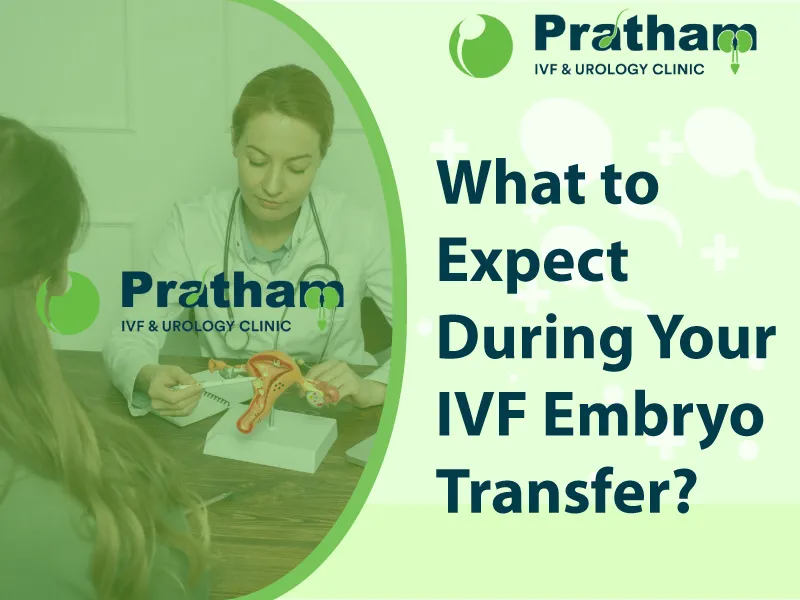
The journey of IVF Embryo Transfer is an emotional and exciting phase in fertility treatment. After weeks of preparation, medications, and embryo development, the embryo transfer is the final step before pregnancy testing. But what exactly happens during IVF Embryo Transfer? What can you expect? How can you increase your chances of success?
If you are undergoing IVF Embryo Transfer, understanding the process in detail can help you feel more confident and prepared. In this blog, we will break down the entire IVF Embryo Transfer procedure, discuss preparation tips, and share what to expect before, during, and after the transfer.
What Is IVF Embryo Transfer?
IVF Embryo Transfer is the final stage of In Vitro Fertilization (IVF), where a fertilized embryo is placed into the uterus to establish a pregnancy. The procedure is simple, painless, and does not require anesthesia. After fertilization, embryos are cultured in a laboratory for several days before they are transferred into the uterus. If the embryo implants successfully in the uterine lining, pregnancy occurs.
Types of IVF Embryo Transfer
There are different approaches to IVF Embryo Transfer, depending on the patient's medical history and fertility plan. The main types include:
- Fresh Embryo Transfer: In a fresh cycle, the embryo is transferred a few days after fertilization, typically on Day 3 or Day 5.
- Frozen Embryo Transfer (FET): Frozen Embryo Transfer (FET) involves freezing embryos from a previous IVF cycle and transferring them later. Many doctors recommend FET as it allows the uterus to recover from stimulation medications, increasing implantation chances.
- Blastocyst Transfer: Blastocyst transfer happens on Day 5 or Day 6 of embryo development. Blastocysts have a higher implantation rate, as they are more advanced in growth.
-
Single vs. Multiple Embryo Transfer:
- Single Embryo Transfer (SET): Reduces the risk of multiple pregnancies.
- Multiple Embryo Transfer: Increases chances of pregnancy but carries risks like twin or triplet pregnancies.
What Happens Before IVF Embryo Transfer?
Before your IVF Embryo Transfer, your doctor will prepare your body for implantation. Here’s what you can expect:
- Uterine Lining Preparation: The success of IVF Embryo Transfer depends on the thickness of the endometrial lining. A healthy uterine lining (8-12mm) is necessary for implantation. Hormonal medications like progesterone and estrogen are prescribed to support this process.
- Embryo Selection: Before IVF Embryo Transfer, embryologists select the best-quality embryo based on its development, morphology, and genetic testing results.
- Progesterone Support: Progesterone is crucial for implantation. It can be given as injections, vaginal suppositories, or gel.
- Pre-Transfer Ultrasound: A transvaginal ultrasound is performed to check uterine lining thickness and confirm that the uterus is ready for IVF Embryo Transfer.
-
Lifestyle Adjustments:
- Eat a nutritious fertility-friendly diet rich in antioxidants, folic acid, and omega-3.
- Avoid alcohol, caffeine, and smoking, as they reduce implantation success.
- Manage stress with yoga, meditation, and relaxation techniques.
Step-by-Step Process of IVF Embryo Transfer
The IVF Embryo Transfer is a quick, painless procedure that takes about 10-15 minutes. Here’s what happens during the transfer:
-
Arriving at the Clinic
- You will be advised to drink water before the procedure to have a full bladder.
- A full bladder helps improve ultrasound visualization of the uterus.
-
Positioning and Preparation
- You will lie on the examination table with your legs supported.
- The doctor will use a speculum to gently open the vagina, like a Pap smear test.
-
Embryo Transfer Procedure
- A catheter (thin, flexible tube) containing the embryo is inserted into the uterus.
- Using ultrasound guidance, the doctor carefully places the embryo in the best position for implantation.
- The catheter is removed, and embryologists confirm that the embryo has been successfully transferred.
-
Rest and Recovery
- You may rest for a few minutes before leaving the clinic.
- There is no need for bed rest, but light activity is recommended.
What to Expect After IVF Embryo Transfer?
The two-week wait after IVF Embryo Transfer can feel long and emotionally overwhelming. Here’s what you can expect:
-
Implantation Symptoms
- Mild Cramping – A sign that the embryo may be attaching to the uterus.
- Spotting or Light Bleeding – This can happen around 5-7 days post-transfer, known as implantation bleeding.
- Bloating and Breast Tenderness – Due to hormonal changes from progesterone.
-
Activity Recommendations
- Avoid heavy lifting, intense workouts, and excessive stress.
- Continue taking all prescribed medications to support implantation.
- Eat healthy foods rich in fiber, protein, and essential vitamins.
-
Pregnancy Test
- A blood test (Beta hCG test) is performed 10-14 days after IVF Embryo Transfer to confirm pregnancy.
IVF Embryo Transfer Success Tips
- Follow Medication Guidelines: Never skip progesterone support.
- Stay Hydrated & Eat Well: A balanced diet supports embryo implantation.
- Manage Stress: High stress levels may negatively affect pregnancy chances.
- Get Enough Sleep: Aim for at least 7-8 hours of rest each night.
- Avoid Smoking & Alcohol: These reduce fertility and implantation rates.
By following these IVF Embryo Transfer success tips, you can maximize your chances of a successful pregnancy.
Common Questions About IVF Embryo Transfer
- Is IVF Embryo Transfer painful?
No, it is a painless procedure, like a Pap smear test. - Can I pee after IVF Embryo Transfer?
Yes, you can empty your bladder immediately after the procedure. - How long should I rest after IVF Embryo Transfer?
Normal daily activities can be resumed but avoid strenuous exercise. - What should I avoid after IVF Embryo Transfer?
Avoid hot baths, excessive caffeine, and stress.
Why Choose Pratham IVF?
At Pratham IVF, we believe that every patient deserves personalized, compassionate, and expert fertility care. Our team of skilled fertility specialists offers state-of-the-art IVF Embryo Transfer techniques with high success rates. We provide advanced embryo selection methods, cutting-edge technology, and comprehensive patient support to help you achieve a successful pregnancy. With a commitment to excellence, innovation, and patient-centered care, Pratham IVF is the trusted choice for couples seeking fertility solutions.
Conclusion
IVF Embryo Transfer is a critical step in the fertility journey. Understanding what to expect before, during, and after the transfer can help reduce anxiety and improve success rates. With proper preparation, a healthy lifestyle, and expert medical care, you can increase the chances of a successful implantation. If you're on your IVF journey, staying positive and trusting the process is essential.
Ready to take the next step in your IVF journey? Call +91 9879780105 or email prathamivf@gmail.com Ready to take the next step in your IVF journey? Call
 Ahmedabad Top Rated IVF Center
Ahmedabad Top Rated IVF Center




